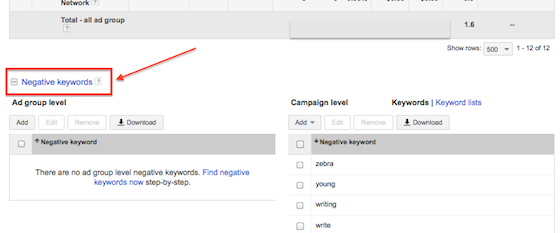 Negative keywords? YES, the use of negative keywords when doing an online book advertising campaign is often overlooked by authors and can cost you unnecessary clicks and $$$!
Negative keywords? YES, the use of negative keywords when doing an online book advertising campaign is often overlooked by authors and can cost you unnecessary clicks and $$$!
WHAT ARE NEGATIVE KEYWORDS
Negative keywords are keyword exclusions. Searchers type many terms into the search bar that Google thinks are associated with your selected keywords and they will trigger your ad to show to that searcher. This occurs when you are using broad match type keywords, most commonly used by authors or broad match modified and phrase match type keywords, more advanced forms of advertising keywords. I will save that for another post.
For example, you wrote a contemporary romance novel and used romance novels as one of your keywords. A searcher searching for medieval romance novels could see and click on your ad. That person may not be the best candidate to buy your book, but it cost you!
The goal is to get high quality clicks on your ads.
You want clicks from searchers more apt to buy your type of book and avoid the lookie loos that cost you $$$.
HOW TO FIND NEGATIVE KEYWORDS
For a New Campaign
If you are setting up an online book campaign, you can use the Keyword Planner in your AdWords account. The Keyword Planner is not just for finding good keywords to use in your campaign; it will also provide you with potential negative keywords to use. The Planner is located under the “Tools” tab.
Start by typing in the keyword(s) you want to use and then review the results. The planner will return all the terms it thinks are associated with your target keyword(s). For example, let’s say you wrote a romance novel
Keyword:
Romance Novels
Here is a sampling of terms from the first page of results.
Results:
historical romance novels
romance novels online
western romance novels
free romance novels
modern romance novels
contemporary romance novels
paranormal romance novels
steamy romance novels
medieval romance novels
scottish romance novels
fantasy romance novels
funny romance novels
These are just 12 of the 800 keyword phrases returned! Many of these terms have the potential to trigger your ad with the use of “romance novels” as one of your search terms.
For an Existing Campaign
If you are already running a campaign, click on the keywords tab to view your keywords. Next, click on the “Details” tab just to the right of the red “+ Keywords” button and drop down menu will appear and under “SEARCH TERMS.” Select “Selected” or “All.” This will show you the search criteria searchers typed in that triggered your ads and that you received clicks on.
Selected: To view all the terms for a specific keyword you are using. Just put a check by your keyword.
All: To view all the terms for all keywords you are using.
HOW TO USE NEGATIVE KEYWORDS
Once you have identified those keywords you don’t want to trigger your ads, you can enter them at the bottom of your keyword list. Under the Keywords tab, navigate to the bottom of the page. Click on the blue “Negative keywords” on the right. You have a choice to enter your negative keywords at the ad-group level where they will only operate in a specific ad sub-group or at the campaign level where they will operate on the entire campaign and its entire ad sub-groups.
Once your campaign is running, you should monitor your keywords regularly to ensure you are getting quality clicks. Your list will expand over time. I have some campaigns with 200+ negative keywords and some with just one.
Caution: I typically enter single terms, e.g., free, Scottish, medieval, paranormal, etc. I find this is most effective and helps avoid the potential for interference with my target terms. Periodically check to ensure the negative term is not interfering with your target terms. AdWords will alert you if this is occurring.
SUMMARY
When doing online book advertising, be sure to include negative keyword research as part of your normal keyword research to avoid unnecessary clicks that cost you $$$.





